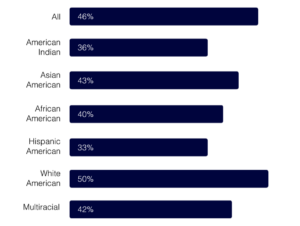A high school junior once told Kent Pekel, President and CEO of Search Institute, about a transformative conversation she had with a teacher. Here’s an edited excerpt from the exchange:
STUDENT: “I think I always felt like I was the dumb kid in my English class because even though I always took more difficult classes, for some reason I just struggled in English. But I talked to the teacher one day about it and she said, ‘No, don’t beat yourself up, you’re actually just as good as the rest of the class.’ I needed to hear that, I guess, and it really made me think about myself… Like, even if you think you’re the dumb kid, you really aren’t. It’s all just perception. Some kids come off as super smart when really, they aren’t any smarter than you.”
PEKEL: “Did that have a big impact on you when that teacher said that?”
STUDENT: “It did, actually. It really got me thinking like, ‘Oh! Maybe I’m smarter than I think I am’.”
In that exchange, that student began shifting from a fixed mindset to a growth mindset. Students who believe that “smart is what you work to become” are benefitting from a growth mindset. They are much more likely to work hard, learn from setbacks, and grow through the challenges they encounter. Those who believe “smart is what you are” are being limited by a fixed mindset. They are more likely to “coast” on their abilities or to give up based on the belief that they’ll never get better.
Stanford psychologist Carol Dweck, a pioneer in mindset research, reminds us that “test scores and measures of achievement tell you where a student is, but they don’t tell you where a student could end up.” As teachers, we need to take the long view, seeking to cultivate the potential and learning in each and every student.
Creating growth mindsets in students and ourselves is the foundation of that commitment.
What Are Growth and Fixed Mindsets?
Many people view intelligence and ability as characteristics that are mostly fixed from birth and that don’t change much over the course of a lifetime. However, the way that students think about their own intelligence affects the amount of effort they exert in school and in life, according to groundbreaking research by Stanford University’s Carol Dweck. She contrasts “growth mindsets” with “fixed mindsets”:
Fixed Mindsets
What are they? Students, teachers and parents believe there isn’t much a person can do to increase her or his level of intelligence. Intelligence is static. When people have these mindsets, they…
- See challenges or setbacks as confirming their lack of abilities. If it’s hard, they must not be good enough.
- Respond with destructive thoughts (e.g., “I failed because I’m dumb”), feelings (e.g., anxious, incompetent), and behaviors (e.g., giving up).
- Worry about proving abilities rather than improving them.
- Are less likely to invest in improving the academic performance of students who struggle.
Growth Mindsets
What are they? Students, teachers and parents believe that it is always possible to increase intelligence with effort. When people have these mindsets, they…
- See mistakes and failure as opportunities to learn and improve.
- Respond with constructive thoughts (e.g. “Maybe I need to change strategy.”), feelings (e.g., the excitement of a challenge), and behaviors (e.g., persistence).
- Value learning and growth over looking smart and they see putting in effort as a virtue, not a sign of inability.
- Focus on long-term learning, not momentary setbacks.
In reality, each teacher, parent and student has a mixture of fixed mindsets and growth mindsets about different parts of themselves, including school subjects. (Many students have fixed mindsets about their ability to succeed in math, for example.) The opportunities lie in recognizing these aspects of each person in order to be more intentional about how to respond to challenges and new learning.
Why Do Growth Mindsets Matter For Students?
Students’ mindsets have a strong association with many aspects of their learning and growth. Having growth mindsets:
- Can influence students’ grades. Teaching students to have growth mindsets can significantly increase their grades and achievement test scores.
- Helps students continuously learn and improve, whereas those with fixed mindsets continue to struggle.
- Is particularly important for students who face stereotypes about their abilities. Having growth mindsets can keep them engaged and doing well, even in the face of stereotyping.
An Important Caveat: Although mindsets matter, many students also face tremendous systemic obstacles and challenges to doing well, including poverty, discrimination and violence that undermine their safety, family stability and hope. Increasing students’ individual abilities to have and strengthen a growth mindset does not lessen schools’ or society’s responsibility to address these fundamental challenges
Self-Efficacy: Does What I Do Matter?
A critical part of growth mindsets is a belief that what we do will yield results that we want. If we don’t believe we have the power to affect the outcomes, why bother? Students who believe they can influence their own situation (their personal power) can positively affect their motivation to learn, their academic achievement and aspirations and the career options they see for themselves. (If they believe they have personal power, they see more options and they invest in preparing themselves more for the future.)
Search Institute asked about 90,000 middle and high school students about their own sense of personal power, including whether they think they have control over things that happen to them and their ability to come up with other solutions when things don’t go well. As we would hope, this sense of personal power increases as students mature from 6th to 12th grade. (Among 6th graders, 39% report having personal power, compared to 54% among 12th graders.) However, students of color, who typically face greater social barriers or prejudice, are less likely to experience this sense of personal power.
Teachers’ Mindsets Matter, Too
How teachers think about intelligence can also influence students’ mindsets and achievement. To document this connection, researchers measured teachers’ mindsets at the beginning of the year and then monitored student achievement through the year. Some teachers had fixed mindsets, believing that they had no influence on their students’ basic intellectual capabilities. Other teachers had growth mindsets, believing they could enhance their students’ levels of intelligence.
How did this difference affect student achievement, particularly for those students who began the year as low achievers? When teachers with fixed mindsets taught these students, their achievement levels didn’t change during the school year. However, when students with similar achievement levels were taught by teachers with a growth mindset, many became moderate or even high achievers. Thus, it’s not enough to create growth mindsets in students. Educators who seek to help all young people develop growth mindsets and succeed in school also need to cultivate growth mindsets in themselves and then convey the benefits of creating growth mindsets to students through what they say and do in the classroom.
Self-Handicapping: A Feature of a Fixed Mindset
Sometimes students consciously or semi-consciously do things that reduce their chances of doing well, such as deciding not to study for a test, disrupting class or failing to turn in an assignment. This “self-handicapping” behavior is a particularly problematic part of a fixed mindset. Researchers have identified five forms of self-handicapping:
- Procrastination: Enables the student to blame putting off studying for poor performance rather than lack of knowledge or skill.
- Lost (or eaten) Homework: Enables the student to blame disorganization or an animal for poor performance.
- Setting Low Goals: Enables the student to tell herself and others that she succeeded despite poor performance.
- External Excuses: Enables the student to blame illness or a bothersome person for poor performance.
- Halfhearted Effort: Enables the student to claim he would have done well had he tried harder.
Sometimes students self-sabotage to preserve self-esteem or social status. They may do it because they believe their effort won’t make any difference because of forces beyond their control, such as experiencing bias because of their cultural background or income. “The teacher was never going to give me a good grade anyway,” the student might say to himself or herself, “so I didn’t even try.” When self-handicapping seems to be occurring, interventions that encourage a growth mindset may be particularly effective and important — especially when students’ perceptions are validated and they are given opportunities to identify strategies to make good choices in the face of those biases
The Do’s and Don’ts for Creating Growth Mindsets in Students
Do: Emphasize learning goals, which focus on what students will be able to do or understand as the result of completing a task.
Don’t: Focus only on performance goals, such as getting a certain score on a test or a certain grade in a class. Some performance goals can be healthy, but they should not be the focus.
Do: Praise students for effort, for challenging themselves and for the methods they use to complete tasks and overcome obstacles.
Don’t: Praise students for getting the right answer without trying hard or for completing a task quickly and without much effort. (Such as: “Wow! You did that quickly and you didn’t even break a sweat. That’s great!”)
Do: Attribute success to working hard and using good strategies to accomplish goals and solve problems.
Don’t: Describe certain students as “smart.” Although innate ability matters, many people overestimate its importance, either in specific subjects or in general.
Do: Give opportunities for students to revise their work to correct mistakes and improve their work. Emphasize the revised work as much as the initial attempt.
Don’t: Assume that if students don’t get it right the first time, they won’t do better the next time.
Do: Embrace mistakes. Mistakes are necessary to improve in anything. Sometimes students who get the right answers or get the skills quickly become even more afraid to make mistakes.
Don’t: Reinforce students’ self-criticism when they make errors; rather, recognize them for “sticking their neck out” to take a risk.
Do: Model learning from mistakes. Step back and highlight the mistake without alarm or embarrassment. Think out loud about the problem or ask the students to help you figure it out.
Don’t: Maintain a fixed mindset about your own expertise or about students. When teachers do not see themselves or their students as having potential to grow and learn, it undermines growth mindsets in students.
Do: When you critique students’ work, focus on giving feedback about the process uses. Say something like: “Maybe you could think of another way to do it.” This encourages them to keep working on it.
Don’t: Focus on the person when giving negative feedback. (“I’m very disappointed in you”). This reduces their desire to continue working on a task.
Below you will find the full Mindset for Growing guide. Click the button to download a PDF with class activities, statistics, research and references around creating growth mindsets in students.
WANT TO USE JOSTENS RENAISSANCE?
If you are a Jostens customer and you need a login to access all the resources on JostensRenaissance.com, email your rep or click here.
If you don’t currently partner with Jostens for yearbooks or graduation regalia or other celebratory products, you can learn more here.
Jostens partnered with Search Institute to provide research-based data and advice for dealing with common school challenges. Over the past 30 years, Search Institute has studied the strengths and difficulties in the lives of more than five million middle and high school youth across the country and around the world to understand what kids need in order to succeed. Like Jostens Renaissance, Search Institute focuses on young people’s strengths, rather than emphasizing their problems or deficiencies. Visit SearchInstitute.org to learn more.


